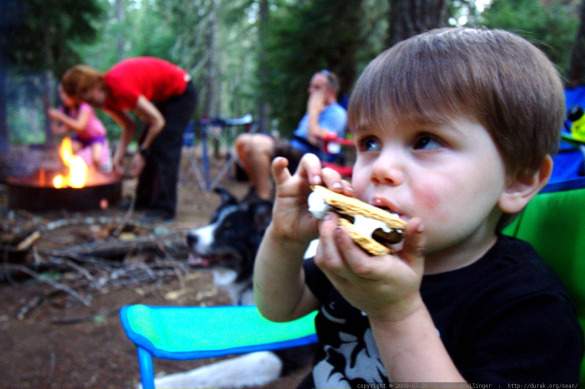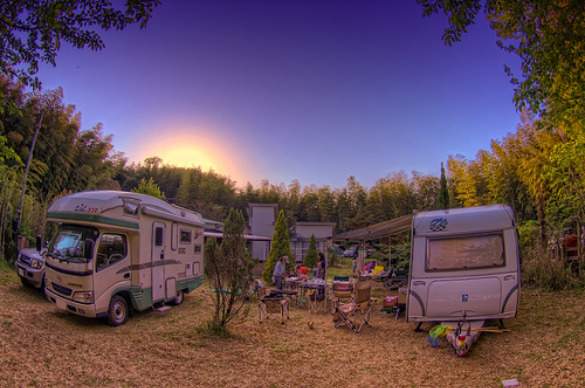♫Hello brudder
hello sister
While I write here
comes a twister
Hope someone will
find this letter
Guess I should have taken time to check the weather.♫
Alan Sherman’s ballad about life at Camp Granada was spot on. It’s all about the attitude. The unhappy camper wrote his parents about poison ivy and alligators, reporting that his bunkmate had come down with malaria. We tend to exaggerate about the out of doors. Away from home, mosquitoes are the size of humming birds. A pebble under your bedroll feels like the pea did to the princess. The weather turns arctic (or equatorial). Thunder, lightening and hail, visits from skunks, snakes and folks from the tent next door who want to recite their health record and genealogy are the things we remember. But none of this keeps us from heading for the woods.
Reasons people give for wanting to go camping seem plausible. There’s the call of nature. Thoughts of fresh air, cold mountain streams, starry nights, and the smell of pine prompt us to pack our minivans and get out of Dodge. Sights and sounds that don’t rely on cords, batteries or satellite signals are increasingly precious. Maybe we just want to prove we can go a weekend without cable.
Some of us are driven to explore remote caves, clomp around in the Antarctic or desert places in search of alpine flowers or zebra. We want to see wild things like cactus or moose—but not alone. Roughing it loves company. Camping is conducive to bonding, memory making, and of course, educating. “Kids, did you know there are 47 species of blueberry?”
Camping = nostalgia

What it boils down to is the desire to relive childhood. “Every summer we packed the car and drove to the mountains/beach/national forest where we hiked, swam, collected shells or rocks and sang Row, Row, Row Your Boat for most of the 600 miles.” This is the way a child remembers My Summer Vacation, while the parents’ version has kids wanting to know if “we’re there yet,” fencing with BBQ skewers and throwing up after the third bag of marshmallows. Must be it was worth it: the kids who survived now make it their life’s ambition to recreate the experience for their own children.
Bonding, nature—those are the respectable reasons. The stuff you talk about when you go back to the office. The real reasons are baser.
Setting up camp is playing house

Camping isn’t necessarily crude or budget-minded. George Eastman, founder of Kodak, loved camping and had it down to a science. He designed nesting pans, could whip up a lemon meringue pie out of doors, and made his bed fastidiously whether in Rangoon or at home in Rochester, New York. Not knowing it would catch on—he might have applied for a patent—Eastman enjoyed “glamping,” the made-up word for glamorous bring-on-the-champagne camping.
When you camp, you take your pretend stove and make-believe bed and stake out your cooking and sleeping areas. All those gadgets: combination bug zapper/weenie roaster; little packets of powder that turn in to beef stew if you rub them between your hands; chairs and fishing poles that telescope into lunch boxes? They’re just toys for adults.
Kids love to carry the world around in a case that opens up into an entire airport or doll’s beach house. It’s not solely for convenience that the pricey motor home has a child-size sink, a table that morphs into a bed, cargo nets and compartments that take you back to the tree house you had when you were a kid. There’s a Robinson Crusoe romance in stringing a line for wet towels, gathering kindling and setting stones for a fire ring. Even if the dishes are neon-colored plastic and the lantern runs on a battery, you imagine yourself a pirate. Has anything changed since the summer you were ten?
Camping is about survival

Camping is not all fantasy. It’s earthy, an exchange of smooth sheets and climate control for a close encounter with the elements. Lunch on a limp paper plate and the wind chasing your napkin away while a squirrel runs across the table make mealtime interactive if not survivalist. You guard your plate against creeping things, fish gnats out of the lemonade. It’s barely civilized, yet a half-burned pork chop never tasted as good. Going to the bathroom behind a tree is brash: creatures might be watching. What’s this lush plant, the shiny one with three leaves? It’s as reckless as skinny-dipping, but just as rewarding—you feel the water as if it were the first time.
Rough and tough camper Teddy Roosevelt shrugged off the weather and slept easily on the ground after hours on horseback. That doesn’t mean he was oblivious to flowers or birdsong. Obviously he was under some kind of spell. John Burroughs wrote about him in The Atlantic in 1906. “He craved once more to be alone with nature; he was evidently hungry for the wild and the aboriginal,—a hunger that seems to come upon him regularly at least once a year…”
Whatever your personal reasons for camping, you just don’t get it out of your system. For his fourth birthday, I gave my grandson his own sleeping bag and we slept in the backyard in a tent. No one should go through childhood without feeling the sun and the rain beating on canvas (well, nylon – he’ll never believe how much tents used to weigh), the feeling of being inside a cocoon with the night all around. Too bad nights in central New York, even in July, can be cold and damp enough to aggravate asthma. I carried him back inside in the wee hours, but I hope he’ll have lots of other chances to make his bed out of doors. And lie in it, too.
Dear Grandma,
♫I liked camping
it was awesome
Even if it
made me cough some
If we sleep out
under a tree
Do you think we could arrange to have some TV?♫
Photos by: sean dreilinger, /\ltus, palojono